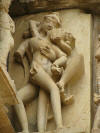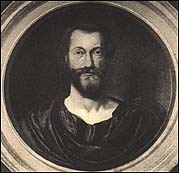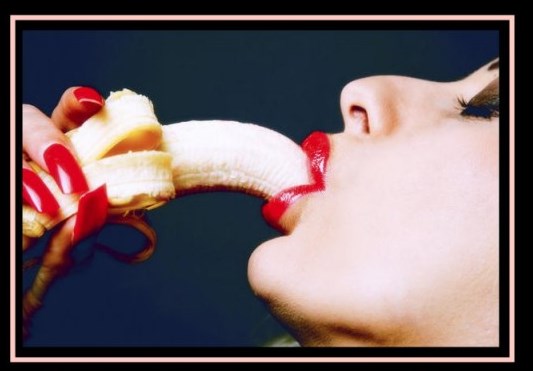
Eroticism or Obscenity
Extracts from an introduction to eroticism in poetry presented to a U3A group in Barnet in 1992.
by
Joe Sinclair
[Click on the underlined titles of verse in the text to view the entire poem]
This talk on what constitutes eroticism in verse will, by and large, take its starting point with John Donne and complete the survey with John Fuller.
A dictionary definition of eroticism is "a theme intended to arouse sexual love or desire". This is descriptive; it is not judgemental. The entire erotic experience, from budding love to the aftermath of consummation, is represented in lyric poetry. Above all, poets have been attracted to the laments of separated lovers.
"Obscenity", on the other hand, is judgemental, being described by the OED as "highly offensive; morally repugnant".
A distinction thus needs to be drawn between the erotic and the obscene. In verse, direct references to genital organs are rarely, if ever, erotic. Body parts with less overt sexual connotations, such as breasts and buttocks, are more readily susceptible to erotic treatment. The erotic and devotional lyric merge naturally. This is one reason why- as we shall see later - John Donne was chosen as a kicking -off point. This aspect of poetic eroticism is also particularly noticeable in Indian love lyrics where, at times, it can be difficult to determine whether the use of free sexual imagery is meant literally or as an allegory of the human soul courting the love of its god.
The poetry of eroticism tends to replace direct statements of sexual desire with various forces of poetic indirection, such as wit, suggestiveness, irony and, above all, the use of symbol and poetic imagery. In a way it corresponds in reality to the psychological processes whereby sexual gratification is delayed, such as the foreplay that prolongs the enjoyment of pre-coital tension and the concentration on secondary sexual characteristics.
Love poetry, therefore, celebrates its females not merely by virtue of their availability for copulation, but for their beauty, their wit, their dress and voice and perfume. It represents an expression of total activity and not merely of consummation. Shakespeare's Romeo and Juliet provides many illustrations of this premise.
It seems she hangs upon the cheek of night
As a rich jewel to an Ethiop's ear -
Beauty too rich for use; for earth too dear!
It is a speech that is turned to poetry by its ambiguity and by the imagery which precedes the last line. Is the Ethiopian too ugly to deserve the jewel? Or is the jewel enhanced by the black skin?
Mercutio who delights in references to sexual activity, who hints regularly that foreplay is but a waste of time, can mock
Lovers can see to do their amorous rites
By their own beauties; or, if love be blind,
It best agrees with night. Come civil night,
Thou sober-suited matron, all in black,
And learn me how to lose a winning match
Played for a pair of stainless maidenhoods.
A clear reference to the sexual act, and in particular to the loss of virginity and, though the experience is quite unambiguously copulation, the wit places us at a distance from the experience.
An even clearer example of the erotic nature of imagery, even when it is obvious that copulation is being described, is provided by Thomas Carew, whose imagery was influenced by Donne who he admired excessively. One of the more bawdy and sensuous of his works is A Rapture which has often been regarded as indecent, as it covers the entire compass of the sexual act from
There my enfranchised hand on every side
Shall o'er thy naked polish'd ivory slide
through to
Yet my tall pine shall in the Cyprian strait
Ride safe at anchor, and unlade her freight.
But the charge of obscenity might almost be replaced by one of propriety by the splendid use of imagery and indirection. Just for contrast, let me introduce here some lines of verse that were published more than 200 years later by the American Walt Whitman, who wrote in Leaves of Grass:
I do not press my fingers across my mouth,
I keep as delicate around the bowels as round the head and heart,
Copulation is no more rank to me than death is.
Is Whitman more erotic, do you think, than Carew? More obscene? The imagery would seem to be lacking, and this may account for the fact that Leaves of Grass was condemned by Victorian society; a fate that was not shared by Carew.
Let me give a further instance of the contrast between the erotic and the obscene. The first example, which I regard as one of the greatest - albeit one of the shortest - of love poems, and verges on the decorous rather than erotic, is attributed to that very prolific Anon:
Western Wind when wilt thou blow
The small rain down can rain?
Christ, if my love were in my arms
And I in my bed again!
And the contrasting piece of verse comprises two lines from Tennyson's Fatima
Before he mounts the hill, I know
He cometh quickly: from below.
Okay. So it has been taken out of context. But one wonders if it is a deliberately crude pun, of which there are many such in the annals of verse, or simply unintentional.
And now - perhaps too long delayed - let me turn to John Donne, who was to have been my starting point.

Donne, whose life straddled the sixteenth and seventeenth centuries was one of the foremost metaphysical poets. Not only a poet, but a Church of England clergyman.in addition to being a satirist and a lawyer. Highly prolific, he produced sermons and Latin translations in addition to his poetry which comprised sonnets, elegies and songs, noted for their sensual and erotic style that was rich in wit, misdirection and paradox. His dialectical wizardry and use of the syllogism provoked his readers with their subtlety and is most in evidence in such poems as The Extasie and The Flea. Indeed, it is worth comparing the indirection of Donne's Flea with the section of Carew's A Rapture that begins "Then as the empty bee that lately bore . . . ". (line 55).
I regret that I cannot provide the provenance for the following comment with which I enhanced my talk, but it is more than worthy of repetition here and although I may have paraphrased it at the time, I will give it the honorific quotation marks: "The Flea is a perfect example of Donne's original way of 'wooing' by means of false syllogism, and it comes as no surprise that he later entered the Church, because these methods used by Donne for his amorous verse are more usually associated with the sphere of religion. One could say, I suppose, that he substituted the divinity of religion for the amorously divine."
If there is any doubt about the erotic nature of The Extasie or The Flea, there can certainly by none about what may conceivably be his best-known work in this genre: his Elegy XX To His Mistress Going to Bed. And here - as, indeed, in most of his Elegies - we find a prevalence of sexual puns; but the poem is magnificently erotic.
Skipping ahead slightly, exemplifying erotic poetry by the criteria established earlier, we have from Marlowe's Hero and Leander:
. . . and as she spake,
Forth from those two tralucent cisterns brake
A stream of liquid pearl, which down her face
Made milk-white paths, whereon the gods might trace
To Jove's high court.
Moving onward we have the further example of Keats's Eve of St. Agnes
And now a further leap of one hundred years with the potential here for confusion. The poem entitled General M. and his Young Wife was published pseudonymously by Mr H- and related to the impotence of the poor general and the uncommon patience and cooperation of his wife. Is this section bawdy or erotic?.No prizes are on offer.
Howe'er to cover his disgrace,
She let him keep manoeuvring round the place.
His nightly fondling and stroking
She bore with resignation meek;
When he became downright provoking,
She made him quiet for a week.
It was not oft, you understand
that she was forc'd to take the task in hand.
Erotic? Obscene? Whatever your decision, would you reach the same conclusion with Leonard Cohen's Celebration?

When you kneel below me
and in both your hands
hold my manhood like a sceptre;
When you wrap your tongue
about the amber jewel
and urge my blessing,
I understand those Roman girls
who danced around a shaft of stone
and kissed it till the stone was warm.
Kneel, love, a thousand feet below me,
so far I can barely see your mouth and hands
perform the ceremony.
Kneel till I topple to your back
with a groan, like those gods on the roof
that Samson pulled down.
I personally incline to the erotic, but maybe that's because I'm a man. Perhaps a woman would find it more bawdy.
On reflection, actually, it must be erotic verse since it fulfils once again the criteria for such verse that was established at the beginning, being full of imagery and indirection. And since I proposed to start with John Donne and end with John Fuller (the son, incidentally of Roy Fuller), here is a bit of John Fuller. It was this poem, in fact, that gave me the idea of ending with him. It comes from Manzu.
A girl is seated, nude and placid, lost
In quietness. The pig-tail thick and full
On flashlit shoulder blades. The ankles crossed.
Apotheosis of the animal.
This virginal formality.
A poised ragazza on a rush-seat chair,
Finds cloistral echoes. From a trinket tree
Chickens and saints puncture the thumbed-out air.
And dolphins on the slow cathedral doors
Plunge like a drowning scalp. Within their globe
Bemitred dancers tip-toe and then pause.
The cardinal is sensual in his robe.
Once sees beneath embroidery bare toes
As long as fingers. Youthful age imparts
That faintly turnip shadow to his nose,
That silent smile, affinity of parts.
The buds are breaking. No one is annoyed.
It is a simple drama. Lavish, yes,
But white and delicate. And eyes avoid
The bland Italian ritual of flesh.
And so I reached the end of my presentation 20 years ago. But in thinking back, and reviewing mentally the subject matter and resolution of the thesis I had set myself, I was reminded of an experience I had had some 40 years earlier, in the Company headquarters' office of the Royal Engineers camp where I was serving my military service. Along with my colleagues, I had been enjoying the dissemination of the entire unexpurgated version of The Ballad of Dead Eyed Dick and Eskimo Nell.
My fellow sappers, knowing of my "pastime" of writing poetry, dared me to write something better than the.doggerel we had been enjoying. Subsequently they were vocally dismissive of the abruptness (to them!) of the ending of my poem Eve of Romance. "Aren't you going to finish it?" they complained. Somewhat surprisingly, although I enjoyed the lyrics of Eskimo Nell as much as any of them, I was totally unable to satisfy their clamour for the addition of similar verses to my own work. I, a callow 18-year old, was enmeshed in the web of eroticism; they demanded the obscene. Here they are:
And finally, because it is so clever and so apposite both to this article and the one in The Language section, that I could not decide in which one to place it - so I'm putting it in both!